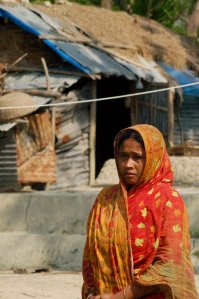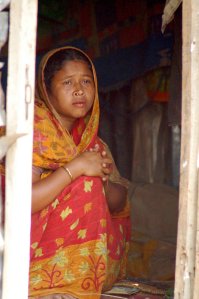Note: If you’re getting tired of my stories from India and Bangladesh, feel free to ignore this post. I’m doing some writing for work and thought I might as well post it here too.
The pumpkin plant grows healthy and strong, as though there were nothing out of the ordinary about its surroundings or its origin. The sun glints through the trees and touches on a healthy, round, and nearly ripe pumpkin peeking out from between the leaves.
It’s such an ordinary thing, this pumpkin plant. For a passerby, it holds no particular meaning. But as Rina Fokir points to it and tells us her story, tears well up in her eyes.
On November 14th, Rina’s 4 year old daughter Momin planted the seed that would result in this healthy pumpkin plant. It was just an ordinary day, with mother and daughter doing ordinary things. Momin’s 3 year old brother Rajib was probably playing nearby. Perhaps they were even singing. There was hope in that little seed being buried in the ground.
The next day, November 15th, at 9:30 at night, Cyclone Sidr hit their village. In the dark, Momin’s father Mamnan clung to his daughter with one hand, while trying desperately to hold onto a tree trunk with the other. A thirty foot wave washed over them, taking with it their home and everything they owned. Despite her father’s frantic attempts to save her, and Momin’s own attempt to clutch her mother’s hair, the little girl was swept away by the wave, never to be seen again.
Now, 4 months later, Rina and Mamnan try to rebuild their lives. With whatever bits and pieces of metal and wood the wave left washed up on the land, they’ve patched together a makeshift home near the empty foundation of their former home. In front of the concrete steps where their home once stood, the pumpkin plant flourishes. Every day, it reminds them of the little girl who planted it.
Weeping, Rina returns to her crooked patchwork house. She sits inside the doorway, wiping the tears from her eyes. The rest of my group wander off to visit another family, but I am left rooted to the ground like that pumpkin plant. My mother heart tears apart as I think of my own small child at home, just a few years older than Momin. My tears come as I meet Rina’s eyes.
 What can I say to her? What gesture can I leave with her that shows that I am not just a voyeuristic foreigner come to take pictures of her grief? I step closer to her home and put my hand on my heart as I gaze across the remains of her old home into her eyes.
What can I say to her? What gesture can I leave with her that shows that I am not just a voyeuristic foreigner come to take pictures of her grief? I step closer to her home and put my hand on my heart as I gaze across the remains of her old home into her eyes.
“I’m sorry,” I say, my voice cracking. “So sorry.” I know she can’t understand my words, but perhaps there is something in our shared motherhood that reaches across the distance of different lifestyles, different countries, and different languages and touches her broken heart.
